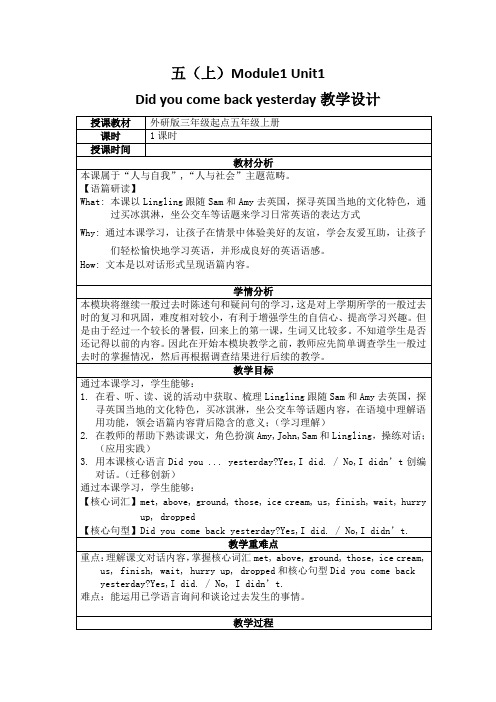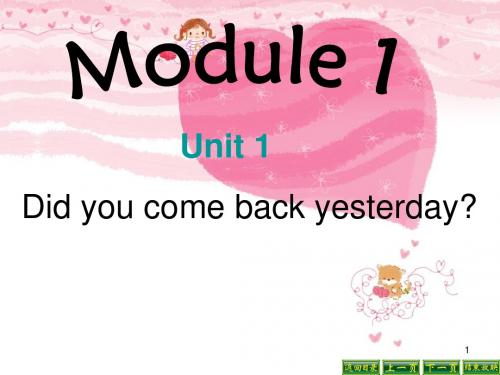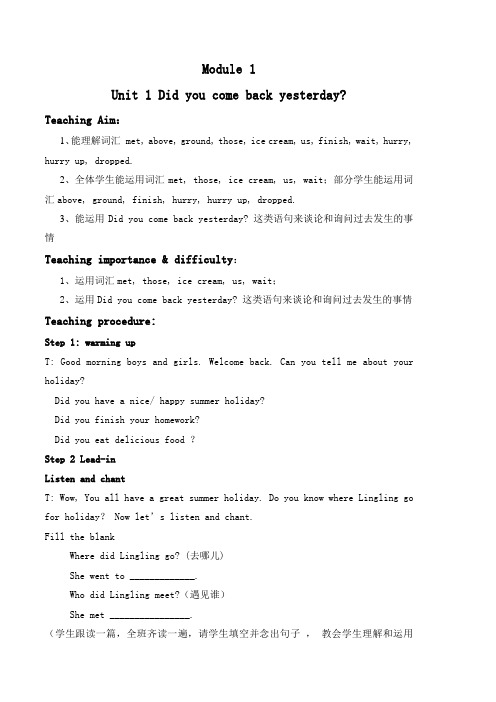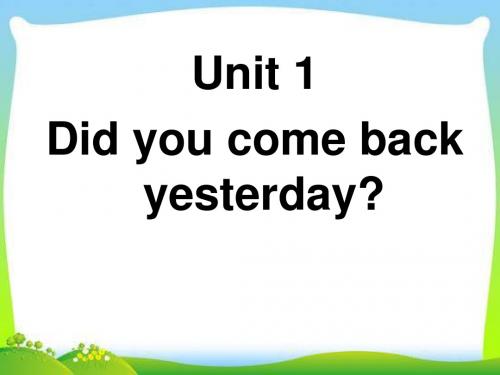最新外研版小学英语五年级上册M1U1Didyoucomebackyesterday
五(上)M1U1 Did you come back yesterday

Step4 Practice
1.Read:
Listen and repeat it.
Read by yourself.
Read in groups.
2.Act out the dialogues
角色扮演Amy,John,Sam和Lingling操练对话。
Step5 Summary
学生根据板书支架语言总结本节课内容,重点掌握Did you ... yesterday?Yes,I did. / No,I didn’t.
教师观察学生操练语篇时的表现,适时给予指导和帮助。
设计意图:进行多种形式操练课文,为迁移创新活动做好铺垫。
3. 用本课核心语言创编对话。(迁移创新)
难点:能运用已学语言询问和谈论过去发生的事情。
教学过程
教学目标(教)
学习活动(学)
效果评价(评)
1. 在看、听、读、说的活动中获取、梳理孩子们讨论将要野餐需要准备食物的对话内容,在语境中理解语用功能,领会语篇背后隐含的意义;(学习理解)
Step1 Warm up
1.Greeting
2.Review the words:
【核心句型】Did you come back yesterday?Yes,I did. / No,I didn’t.
教学重难点
重点:理解课文对话内容,掌握核心词汇met, above, ground, those, ice cream, us, finish, wait, hurry up, dropped和核心句型Did you come back yesterday?Yes,I did. / No, I didn’t.
最新外研版小学英语五年级上册《Module 1 Unit 1 Did you come(1)

《Module 1 Unit 1 Did you come back yesterday》教案Part B教学目标一、知识与技能1.会询问和谈论过去的事情2.让学生掌握基本句型: Did you come back yesterday?\ No, we came back last Sunday.二、过程与方法通过情景展示激发同学的学习兴趣,让同学能够对他人进行询问和谈论。
三、情感态度和价值观乐于感知并积极尝试使用英语。
教学重点让学生掌握基本句型:Did you come back yesterday?-No, we came back last Sunday.We bought ice creams.教学难点询问和谈论过去发生的事情教学方法任务型教学法、情景教学法。
课前准备多媒体课件课时安排2课时第2课时教学过程一、导入新课朗读本课单词三遍,使用“手机”录音,然后与全班同学分享。
Step I. Warming-upListen and actT: Come to the blackboard! Walk back!play football,watch TV,play basketball ,go swimming…Ss: Do actionsStep II. Revision1.Guess: What did I do yesterday?T :do actionsSs :guess and use sentences describe.For examples:(1)(教师做“跑步”的动作)学生用英语描述:You ran yesterday.(2)(教师做”看电视“的动作)学生用英语描述:You watched TV yesterday.二、新课学习1.T: Lingling is in London. Let’s have a look. Where did she go?What did she see? Who did she meet? Listen to the tape twice and answer my quesion.Please turn your book on page 2.T: Now Lingling is in the park with Sam and Amy. Please look at activity 2 carefully. Who can you see?S1:I can see Amy.S2:I can see Sam and Lingling.S3:I can see another boy. He’s John.T: Are Lingling ,Sam and Amy in England or in China?S1: They are in London.S2: I think they are in a park .T: Good job.2.listen and answerT: Did Sam and Amy come back yesterday?S1: No, they came back last Sunday.讲解come back (教师站在教室中间向学生发指令)T: Walk to the blackboard. (学生向黑板走去),教师招手并对学生说: Come back.如此几次,学生理解了come back的意思。
【精品】外研版三起五年级英语上册:m1u1_did_you_come_back_yesterday课件

Amy last Sunday . One day,they went
to the
park
and
.
met
.
John.
They
bought .
some ice creams .They went. home by bus .
And they ran to the bus. Lingling dropped
Yes ,I did ./ No , I came to school by … .
bus
train
13
Did you have rice yesterday ?
Yes ,I did . / No, I had … .
meat
rice
noodles
fish
milk
juice
14
Did you have rice yesterday ?
Command
18
When did Amy and Sam come back?
They came back last Sunday.
They have Chinese friend, who is she?
She is Lingling.
19
When did Amy and Sam come back?
They came back last Sunday.
They have Chinese friend, who is she?
She is Lingling.
20
What did they buy? They bought some ice creams. Do they like ice creams?
小学英语五年级上册M1U1Didyoucomebackyesterday分层作业(含答案)外研版三起

Module 1Unit 1 Did you come back yesterday? 快乐听力一、听录音,选出你所听到的单词。
( )1. A. went B.met C. wait( )2. A. Chinese B. China C. London( )3.A.hurry B. Bus C. run( )4.A.our B. ground C. above( )e B.home C. came二、听录音,选出正确的答语。
( ) 1. A.I'm fine, thank you. B. I'm Amy. C. I'm five. ( )2.A.No,I live in Bejing.B. No, I came back last Sunday .C. No, I came back yesterday .( ) 3. A.She's in London.B.He's in China.C. I'm in Shanghai.( ) 4. A.No, I had noodles yesterday .B. Yes, I had noodles yesterday .课后巩固三.看图,选择对应单词或短语。
A.ice creamB.drop C London D. by bus四、写出下列单词的过去式。
1.goe3.do4.meet5.see6.make7.drop8.visit9.take 10.play 能力提升五、看图,写出正确的单词或短语填空。
1.Yesterday he________ TV.st Sunday she______ to the park..3.Yesterday he______ the piano.4.Yesterday he ______ his car.六、单项选择。
( )1.____________ you come to school last Sunday?A.DoB.AreC.Did ( )2.Do you ____________ in London?A.liveB.livedC.living ( )3.Look ____________ those flowers.Let's buy some. A.for B.at C.on ( )4.We're going to the e ____________ us.A.forB.nearC.with ( )5.We went to Shanghai ____________.st SundayB.FridayC.next Saturday七、根据要求完成句子1. Did she meet Sam yesterday?(否定回答2.Did it rain on Sunday?(肯定回答)3.We came back yesterday.(改成一般疑问句)4.I dropped my ice cream.(改成否定句)5.He has a pen.(改成一般过去式)拓展实践(T)误(F)。
外研社五年级英语上册Did_you_come_back_yesterday教案

Module 1Unit 1 Did you come back yesterday?Teaching Aim:1、能理解词汇 met, above, ground, those, ice cream, us, finish, wait, hurry, hurry up, dropped.2、全体学生能运用词汇met, those, ice cream, us, wait;部分学生能运用词汇above, ground, finish, hurry, hurry up, dropped.3、能运用Did you come back yesterday? 这类语句来谈论和询问过去发生的事情Teaching importance &difficulty:1、运用词汇met, those, ice cream, us, wait;2、运用Did you come back yesterday? 这类语句来谈论和询问过去发生的事情Teaching procedure:Step 1: warming upT: Good morning boys and girls. Welcome back. Can you tell me about your holiday?Did you have a nice/ happy summer holiday?Did you finish your homework?Did you eat delicious food ?Step 2 Lead-inListen and chantT: Wow, You all have a great summer holiday. Do you know where Lingling go for holiday? Now let’s listen and chant.Fill the blankWhere did Lingling go? (去哪儿)She went to _____________.Who did Lingling meet?(遇见谁)She met ________________.(学生跟读一篇,全班齐读一遍,请学生填空并念出句子,教会学生理解和运用met、 above、 ground)Step 3 PresentationText learningT: Now look at this picture. Please tell me who are they?S: They are Amy, Sam, Lingling and John.T: Now watch the video and answer my question1、Where is Linglin Now?2、Did she come back yesterday?3、Does John live near Amy and Sam?4、Did they buy ice cream?Look at those ice creams. They are delicious(运用实物新授单词that 那– those 那些)T: Listen again and answer the question1、Did they go home by bike?2、Did Lingling drop the ice creams?Step 4: practice and consolidationExample:Lingling is in London with Sam and Amy. They came back yesterday. They met John. They bought some ice cream. Then they went home by bus. Lingling dropped the ice cream on John’s shoes.Homework:熟读课文内容向家长描述Amy在伦敦发生的事情。
外研版五年级上册英语M1U1-Did-you-come-back-yesterday

hurry
wait
finish
London Eye
• 伦敦眼(英文名:The London Eye),全 称英国航空伦敦眼(The British Airways London Eye)又称千禧之轮,坐落在伦敦 泰晤士河畔,是伦敦的地标之一,也是伦 敦最吸引游人的观光点之一。伦敦眼于 1999年年底开幕,总高度135米(443英 尺)。伦敦眼共有32个乘坐舱,因舱内外 用钢化玻璃打造,所以设有空调系统。每 个乘坐舱可载客约16名,回转速度约为每 秒0.26米,即一圈需时30分钟。
Lingling is travelling. Listen carefully and find out: Where is lingling now?
Lingling is in_ London Sam and Amy _with______________.
Where did Amy and Sam go?
Summary:
Who can you see in the flash? Where are they? What did they buy in the park? What happened at last?
Who can you see in the flash? I can see Amy, Lingling, Sam and John. Where are they? They’re in the park. What did they buy in the park? They bought ice creams. What happened after that? Lingling dropped her ice cream.
Unit 1 Did you come back yesterday?
Module1 Unit1 Did you come back yesterday(课件++同步)
外研版(三年级起点)五年级上册
Module1 Unit1 Did you come
back yesterday?
Play a game
I do you say
What did I do just now?
You played basketball. You watched TV. You listened to music.
Did you have rice yesterday?
No, I came to school by bus.
No, I had noodles yesterday.
Ask and answer
A: Did you …yesterday? B: Yes, I did./
No, I ….
Homework
Lingling ,Sam and Amy met John and talk.ed with him.
Think and watch
1. Did Amy come back yesterday?
2. What did they buy?
3. What happened to Lingling?
Did you….? 意为 “你(做)……了吗” 肯定回答为Yes, I did. 否定回答为 No, I didn’t.
一般过去时,用来描述过去发生的动作。 在疑问句中通 常要借助助动词did, 在肯定句中动词要使用过去式形式,如 上句come变为came。
Listen ,fill and say
Check the answer
外研版五年级英语上册Module1Unit1Didyoucomebackyesterday教案
回顾复习:
1.过去时态:在说话的这个时间之前,已经发生过的事情或动作。
2.动词过去式:
go___went meet—met visit—visited come—came live—lived have—had do—did see—saw
drop—dropped buy—bought
过程与方法
创设情境对话。
情感态度价值观
培养学生合作学习能力,培养学生综合运用语言的能力。
教材分析
教学重点
使学生在不同情境中听懂、会说主要句型,并能进行关键词替换。
教学难点
在Group work中通过交流,自然的使用所学句型。
学具
录音机
Байду номын сангаас教学过程
环节
教师活动
学生活动
效果反思
导
入
新
课
回顾上节课知识点:同学们,本单元我们主要学习的时态是过去时,什么是过去时?
事情:时间:
play football play basketball yesterday
watch TV fly a kite last Sunday
draw a dragon do homework last night
last Monday
展
示
反
馈
小组成员展示对话:
1. -Did you play football yesterday?
释
难
解
疑
1. -Did you come back yesterday?
-No, We came back last Sunday.
当句子中出现助动词do/does/ did时,后面的动词必须用原形。
小学英语五年级上册 Module 1 Unit 1 Did you come back yester
小学英语五年级上册 Module 1 Unit 1 Did you come back
yesterday 教学设计外研版三起
一、教学目标
1.能够掌握过去式的规则,如在动词原形后加上“ed”等。
2.能够听懂,口头表达以及书写常见的过去时句型,“Did you come back yesterday?”。
3.能够应用所学的过去式知识,完成听力,口语,阅读和写作的任务。
4.培养学生对英语语言的兴趣,积极参与课堂活动。
二、教学重点
1.过去式规则
2.口语表达
三、教学难点
如何让学生掌握过去式的用法。
四、教学准备
1.教师教案和课件
2.学生课外练习册
五、教学过程
1. 导入
通过展示图片、展开主题等方式,调动学生的英语学习兴趣,引入主题,为接下来的学习做好准备。
2. 语音语调练习
在启蒙阶段,借助语音视频等资源,为学生展示英语发音和语调,阐述过去时语法规则,帮助学生更直观地了解语言结构。
3. 四大技能训练
(1)听力
通过播放音频,让学生听到“Did you come back yesterday?。
新外研版(三起)英语五年级上册教案Module-1Unit-1-Did-you-come-back-
新外研版(三起)英语五年级上册教案Module 1Unit 1 Did you come back yesterday教学目标:1、让学生掌握基本句型:Did you come back yesterday-No, we came back last Sunday.2、让学生描述过去发生的事情。
教学重难点:教学重点:让学生掌握基本句型:Did you come back yesterday-No, we came back last Sunday.教学难点:让学生描述过去发生的事情。
课前准备: pictures, cards, tape recorder, computer教学过程:Step I. Warming-upListen and actT: Come to the blackboard! Walk back!play football,watch TV,play computer games ,go swimming…Ss: Do actionsStep II. Revision: What did Miss Yan do yesterday?T do actions, Ss guess and use sentences describe.For examples:1).(教师做做饭的动作)学生用英语描述:You cooked yesterday.2). (教师做打电脑的动作)学生用英语描述:You played computer games yesterday.Step III. Presentation1.出示课文教学图片,T: Who can you see?S1:I can see Amy.S2:I can see Sam and Lingling.S3:I can see another boy. He’s John.T: Are Lingling、Sam and Amy in England or in China?S1: They are in London.S2: I think they are in a park .T: Good job.and answerT: Did Sam and Amy come back yesterday?S1: No, they came back last Sunday.讲解come back (教师站在教室中间向学生发指令)T: Walk to the blackboard. (学生向黑板走去),教师招手并对学生说: Come back.如此几次,学生理解了come back 的意思。
- 1、下载文档前请自行甄别文档内容的完整性,平台不提供额外的编辑、内容补充、找答案等附加服务。
- 2、"仅部分预览"的文档,不可在线预览部分如存在完整性等问题,可反馈申请退款(可完整预览的文档不适用该条件!)。
- 3、如文档侵犯您的权益,请联系客服反馈,我们会尽快为您处理(人工客服工作时间:9:00-18:30)。
M1U1 Did you come back yesterday?教学设计
教学目标:
目标知识与能力:
1. 使学生能听、说、认、读when, back, home, those, ice cream, with, finish, hurry, hurry up, wait, drop等单词。
2. 感知句子When did you come back? We came back …,并理解其意思。
3. Talk about our holiday. Using the words 〝Where did you come back?〞过程与方法:
合作学习,小组学习,交往式学习
情感与态度:
1.激发学生学习英语的兴趣,使学生树立学习英语的自信心。
2.培养学生的合作交流能力
重点 Talk about the past things.
难点使用动词过去式,描述过去发生的事情。
教法 1. Listening to the tape.
2. Group work.
3. Using PPT.
4. Using cards.
学法 1. Listening to the tape.
2. Work in groups.
3. Learning through the PPT.
4. Learning words with the cards
教学
准备 PPT, computer, tape-recorder, tape, cards
预习设计 1. Talk about your summer holiday.
2. Collect the pictures about your holiday.
教学过程二次备课
Step1: Warm up and lead in.
1. Greeting
T: Hello, boys and girls. How are you?
Ss: I’m fine. Thank you!
T: Were you happy in your holiday?
Ss: Yes.
T: let’s talk about our summer holiday, OK?
Ss:OK. (请同学们谈谈自己的暑假生活)
2. lead in
T: Where did you go?
Ss: I went to... (复习go的过去式went.)
T: What did you buy?
Ss: I bought…. (复习buy的过去式bought.)
T: When did you come back?
Ss: …
3. Summary the past tense.
go--went do--did
come--came buy--bought
Step2: New words.
1. Show words cards and teach the Ss the new words. Make some screen to learn the words : drop—dropped (如:通过动作.I dropped my pen/book…) wait—waited
finish—finished
2. Play a game:用单词卡只露第一个字母.让学生猜单词(设计目的:练习单词的认识及拼写能力.)
Step3: Text
T: Do you know Amy and Sam?
Ss: Yes
T: Where did they go?
When did they come back?
Listen carefully and answer the questions.
T play the tape recorder, Ss listen and answer the questions. Play again, read after the tape.
Do the exercises.
Choose T or F.
( ) 1. Lingling is in London with Sam and Amy.
( ) 2. They are back yesterday.
( ) 3. They came back yesterday.
( ) 4. john lives near Amy and Sam.
Check the answer.
Work in groups. Try to act the text out.
Ask some group act in class.
Step4: Survey
Ask you Ss and fill in the form
Where did you go?
What did you by?
When did you come back?
Step5: Summery
Step6: Homework
Do the form after class.
When did you … ?
Name Leave Come back
【板书设计】 unit1 Did you come back yesterday? go—went Did you come back yesterday? buy—bought We came back last Sunday.
do—did
finish—finished
come—came
wait—waited
drop—dropped。
